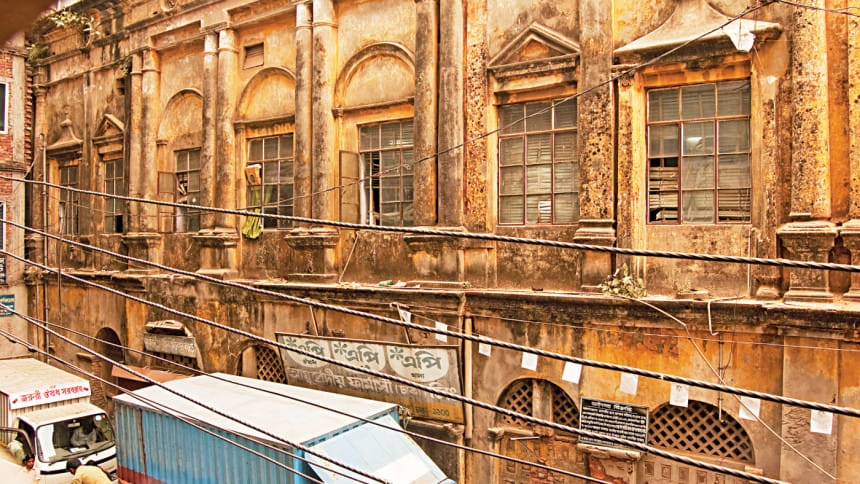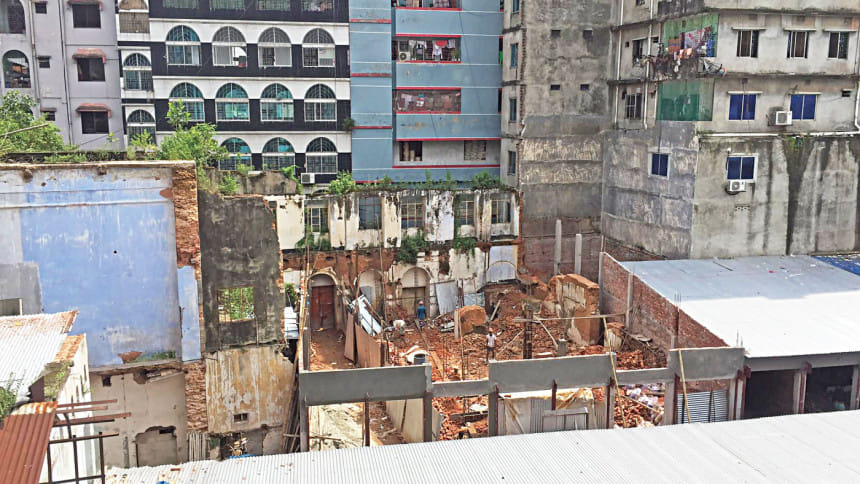Another piece of history demolished

Violating a High Court order, a 200-year-old building on Armenian Street in Dhaka's Armanitola has been demolished by its present owners to make way for shops.
The building originally belonged to Nicholas Pogose, an Armenian elite in the late 19th century and the founder of Pogose School.
For the last few decades, the house was being used as an office and warehouse of a pharmaceutical company.
The attempt to demolish the building started years ago but activists had long been protesting the move.
In 2005, the building was purchased by 18 persons including one Md Enayet Hossain, who claims to have purchased the building from the wife and daughter of the previous owner.

THE HC ORDER
On October 9, 2017, The High Court Division in a suo moto (voluntary) order gave an injunction from proceeding with the demolition or alteration or modification of the building -- located on 8/1 and 8/2 Armenian Street.
The HC came up with the rule following a report published in a newspaper at the time.
The HC had also called upon 11 government agencies including Rajuk, Department of Archaeology and any other person interested in the property and asked as to why a direction shall not be issued upon the respondents concerned to enlist the property as a heritage building.
The court also directed the authorities concerned to take necessary steps to protect, preserve and maintain the said building in its original structure and form.
It had given order to prepare a report as to the present status of the building and file the same before this court within 60 days.
'DEMOLISHED SECRETLY'
But since the beginning of September, amid the pandemic, the building's owners started to demolish the structure secretly and constructed around eight shops at the place after demolishing the whole building, said locals.
Contacted, Enayet Hossain, one of the owners, said they demolished the building after Rajuk published a gazette notification on September 6 enlisting 70 buildings as heritage sites.
He said their building was not in the list.
About the HC injunction, he said they demolished the building after getting Rajuk's list.
He also claimed that it was not Nicholas Pogose's house as there was a factory of an ayurvedic (herbal medicine) company.
"Urban Study Group, based on a false information, claimed it as the house of Nicholas Pogose," he alleged.
"It was one Koilas Chandra Roy who built an ayurvedic factory here and the house of Pogose is situated in Wise Ghat," he claimed.
Contacted, Barrister Mohammad Osman Chowdhury, who first brought up the issue to the HC, said the current owners had no right to demolish the building as the court had given an injunction order in this regard.
"But they still demolished it, which is a contempt of court and a punishable offence as they violated the court's order directly," he added.
Refuting the current owner's claim, Taimur Islam, founder of Urban Study Group, an organisation that campaigns for the conservation of architectural and urban heritage of old Dhaka, said the house belonged to Nicholas Pogose.
ON THE LACK OF RESEARCH ON DHAKA'S HISTORY
Taimur said one of the major problems regarding Dhaka's heritage is the poor level of research on its history.
Although over the last decade many books have been published, most are based on secondary sources. "Often, they are based on a few well-known books from the early to mid-20th century," he added.
"A number of them were written by non-historians. Evidently, they lack the thoroughness expected from professional work. It's very difficult to get detailed information on any particular issue or period. We only get partial information from those…," he continued.
"In the case of Armenians it's even worse. Now we know that as a trading community, albeit a small one, they had practically dominated the economic, social as well as political landscape of the city especially back in 18th and 19th century. But due to lack of adequate primary research very little information can be found on them," he said.
Given the state of historical research, it is not possible to get a clear picture on the history of Pogose School from any particular source. Still enough information is available in the writings of some of the most prominent historians, he said.
Noted historian Syed Mohammad Taifoor made it amply clear who founded the school, when and where.
In his book "Glimpses of Old Dhaka", he writes:
"Dhaka Pogose School is equally a very old school. One Mr Nekie Pogose, an Armenian zaminder in Dhaka, established it in 1848 and maintained the school. Mr Pogose resided on the first floor of the building and its ground floor was occupied by the school itself. The building still stands in Armenian street and is now perhaps the property of the Dhaka Ayurvedic Pharmacy." (Taifoor, 1956)
Taimur said Nicholas Pogose's residence on Armenian street was known as "Nekie Shahib ki Kothi", which was mentioned in the book too.
POGOSE SCHOOL
"We get further confirmation of the information in the Bangladesh District Gazeteers, Dacca (published in 1969)," Taimur continued.
"The Pogose School was founded in 1848 at Armenian Tola (now Armanitola), Dacca, by a well-known Armenian Zamindar Mr NP Pogose. Initially the school was accommodated in the house of Mr N Pogose himself ..." (Rizvi, Ed 1969).
Citing other books, Taimur said Pogose's decision to set up the school was prompted by a controversial decision taken by the government in 1846, which jeopardised lives of about 100 students from Dhaka Collegiate School, who were expelled from the school, for their failure to pay the newly-imposed tuition fees.
He said during the preceding decade, since the establishment of Dhaka Collegiate School, in 1835, the first English medium government school in Bengal, a lot of hope and enthusiasm was created especially among the students from not so well to do families.
Most of them joined the school with the hope of getting preferential treatment to join the public service on completion of the schooling. Besides, the education was free of cost. The school even provided free books to the students, he said.
But then in 1846 the policy of providing free schooling as well as books was scrapped and within a year those 99 students were expelled from the school.
Many students were not able to pay tuition fees. Eventually, the government decided to expel those who failed to pay the fees.
Then the Armenian philanthropist stepped up and set up the school. The school was then called "Pogose Anglo Vernacular School at Dhaka".
Around 1850, the revenue of the school was Rs 50 whilst the expenditure was Rs 90. This deficit was compensated by Pogose, according to historians.
Pogose School's alumni boast many notable figures, including poet Shamsur Rahman, former Prime Minister of Bangladesh Ataur Rahman Khan and the first translator of the Holy Quran in Bengali Girish Chandra Sen.
NICHOLAS POGOSE
The Armenians of Dhaka were a rich and swanky lot. The church that they built in 1781 (Church of the Holy Resurrection) and the area where it stands (Armanitola, named after Armenians) both reflect the influence of this community.
They were affluent merchants and landlords, ruling over markets of jute, leather, salt, etc. Marcar David, for example, was known as the "Merchant Prince of Bengal".
Another such figure was Joakim G Nicolas Pogose, popularly known as Nicky Pogose.
He not only founded the Pogose School in 1848, the first private school in Dhaka, but also served as the first headmaster of the school. He served there till 1855.
He also served as the one of the nine commissioners of Dacca Municipality during 1874-75. He was a partner of the Dhaka Bank (the first bank in the present Bangladesh territory). Pogose was also known for his philanthropic works.
He passed away in 1876.
Today, he lies buried in an exquisite tombstone in Narinda Christian Cemetery. His epitaph reads -- "Till the day breaks and shadows flee away" -- taken from Song of Solomon 2:17.
Shadows do flee away, but it is up to all of us to make sure that a legacy such as Pogose's lives on.

 For all latest news, follow The Daily Star's Google News channel.
For all latest news, follow The Daily Star's Google News channel. 





Comments